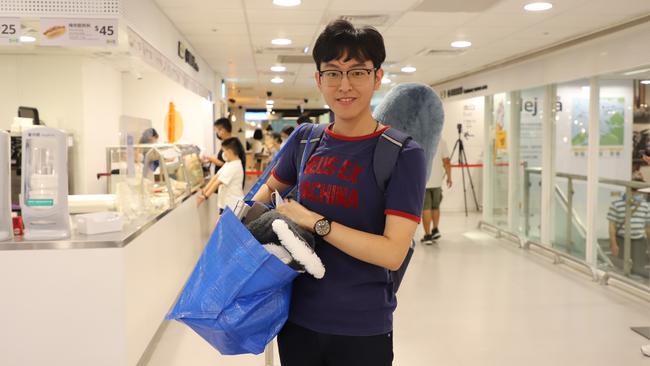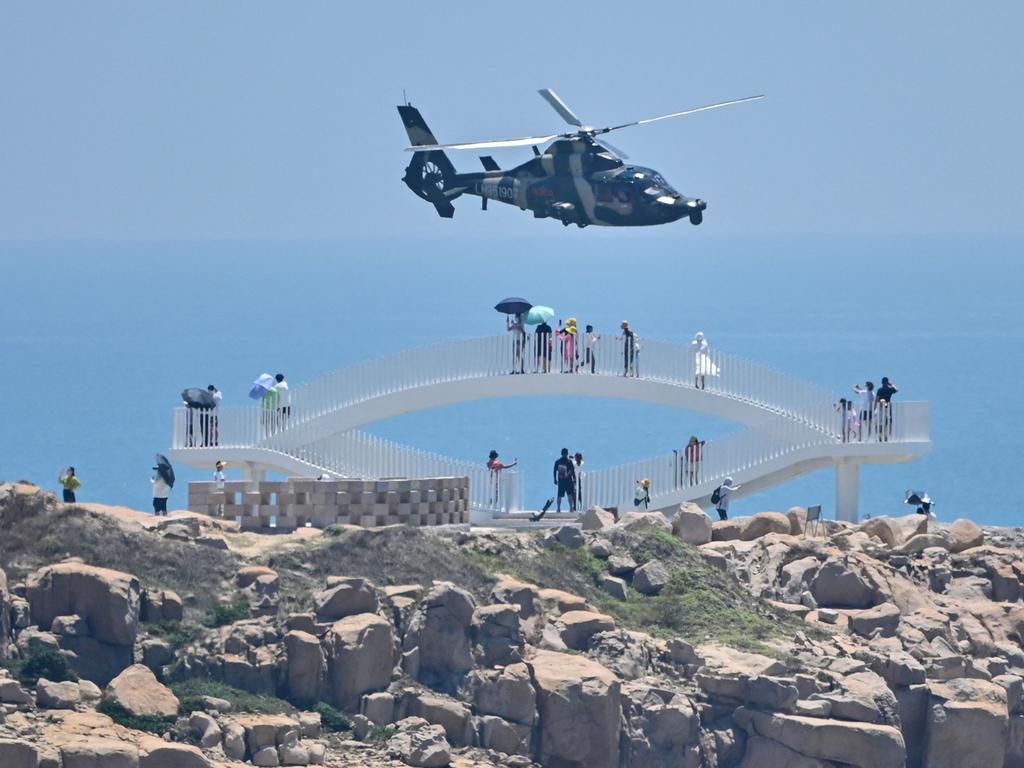Taiwanese defy Xi Jinping by getting on with life, as China threatens war
It takes a lot to rattle Taiwan’s 23 million residents, but China’s threats of war against this liberal democracy have rarely been as ominous.

This was Charlie Kuo’s first Taiwan Straits crisis. It could have been much worse.
On Friday, the 23-year-old interviewed for a job at an international accounting company in Taipei 101, the city’s most famous tower. A few hours earlier, Beijing had blasted a ballistic missile right over Taipei.
By Saturday, as the People’s Liberation Army was practising an invasion of Taiwan in an unprecedented display of Beijing’s might, the accounting graduate got welcome good news.
“They called me and said, we will give you the offer,” Mr Kuo told The Australian on Sunday at the Ikea store in Taipei’s Songshan District.
To celebrate, he was out shopping for furnishings – and a fluffy shark – for his new apartment.
It takes a lot to rattle the 23 million residents of Taiwan. The liberal democracy exists in a permanent state of threat from China.
Right now, Beijing’s threats of war have never looked more ominous.
Last week, China’s leader Xi Jinping ordered an intimidating display of the extraordinary military build-up China has undertaken since the last Taiwan Strait Crisis in the mid-1990s. At least 11 ballistic missiles were fired over Taiwan and in waters around it, including near Japan – both unnerving firsts for the region.
Drones hovered over Taiwanese islands close to China. PLA aircraft swarmed around Taiwan’s airspace. Menacing drills were held in six locations around Taiwan’s main island, in blockade drills Beijing warned could “convert to real combat at any time”.
Dubbed the fourth Taiwan Straits Crisis, it caused alarm around the world and jolted Australia’s already troubled relationship with China. Life was jarringly normal in Taiwan.
The food stalls and bars were busy on Saturday evening at Taipei’s Dadaocheng Wharf when The Australian visited. Teenagers, still on summer holidays, kept practising their dance routines in Liberty Square. Shopping malls were packed as people escaped the mid-30s heat.
I’m out for a walk along the Tamsui River, listening to a (very interesting) panel of Washington experts talk about the “4th Taiwan Strait Crisisâ€.
— Will Glasgow (@wmdglasgow) August 6, 2022
Meanwhile in Taiwan right now… pic.twitter.com/t8Swqcemfo
While people weren’t panicking, of course they were disturbed by Beijing’s aggression.
“All Taiwanese people will worry about (Beijing’s) punishment, but actually we cannot do anything about it,” Chung Nai, 40, tells The Australian, while out shopping.
This was her second Taiwan Strait crisis. The first erupted in the lead-up to Taiwan’s first direct presidential election in 1996, an event that angered Beijing. She spent the first two days of this one doing her banking job at home – because of Covid, not the PLA.
The weekend was spent shopping and on Sunday having a special dinner with her parents before Father’s Day (called “Baba Jie” in Taiwan), which falls on August 8.
Pressed on the future, Ms Chung speaks with a directness common among Taiwanese when asked about the outlook for their liberal democracy, which the Communist Party claims as its own despite never ruling it.
“Taiwan is an island. We don’t have anywhere to hide. So all the people just need to fight together … We can’t jump into the sea,” she says.
Nobody in Taiwan wants war. Many hope China will change some day in the future.
“I think we all hope China can change to a democracy. That’s what we want, what we hope,” Ms Chung says.
A trip by US House of Representatives speaker Nancy Pelosi – the most senior American politician to visit in 25 years – sparked the current crisis. President Xi accused America of “playing with fire” and warned the US to follow its “One China” policy.
China’s Foreign Minister Wang Yi said it was a ploy by “Taiwan independence forces” that would “only tighten the noose around their necks”.
There are mixed feelings about the trip in Taiwan, as to be expected in a vibrant democracy with a noisy media.
Ms Chung says it is hard to judge. “We have a very close relationship with America so it seems like good news. But, China, they are not happy about it.”
In recent days, China has hit Taiwan with a wave of cyber attacks and a trade coercion campaign. Fish, fruit and more than 100 food companies have been black-listed.
Taipei 101, the skyscraper where Mr Kuo interviewed for his job, was lit up on Tuesday night with a welcome message for Ms Pelosi.
The accounting graduate says he would normally welcome the visit of so senior a US politician, but his feelings are tangled after China’s trade strikes.
“I would say, she could come after I get a job … Sorry, a little bit selfish!” he says, laughing.
His parents live in Tainan, in Taiwan’s south, where many of the agricultural companies targeted by Beijing are based. It is also a political stronghold for President Tsai Ing-wen’s ruling Democratic Progressive Party.
Mr Kuo is surer about how Taiwan should respond to Beijing’s actions. “I think the most important thing is local businesses have to not be too dependent on trading with China.”





To join the conversation, please log in. Don't have an account? Register
Join the conversation, you are commenting as Logout